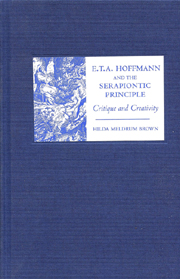Book contents
- Frontmatter
- Contents
- List of Illustrations
- Preface
- Acknowledgments
- List of Abbreviations
- Introduction: Approaches to the Serapiontic Principle
- Part 1
- 1 Overture: Jacques Callot
- 2 Der Einsiedler Serapion: The Formulation of a Principle
- 3 Der Dichter und der Komponist: Text and Music
- 4 Alte und neue Kirchenmusik
- 5 Prinzessin Brambilla: Callot Revisited
- 6 Epilogue: Des Vetters Eckfenster
- Part 2
- Conclusion
- Select Bibliography
- Index
4 - Alte und neue Kirchenmusik
from Part 1
Published online by Cambridge University Press: 05 February 2013
- Frontmatter
- Contents
- List of Illustrations
- Preface
- Acknowledgments
- List of Abbreviations
- Introduction: Approaches to the Serapiontic Principle
- Part 1
- 1 Overture: Jacques Callot
- 2 Der Einsiedler Serapion: The Formulation of a Principle
- 3 Der Dichter und der Komponist: Text and Music
- 4 Alte und neue Kirchenmusik
- 5 Prinzessin Brambilla: Callot Revisited
- 6 Epilogue: Des Vetters Eckfenster
- Part 2
- Conclusion
- Select Bibliography
- Index
Summary
This essay (or, as Theodor describes it, “kleine Abhandlung”) can be regarded as a continuation — and, as will be presently suggested, the climax — of Hoffmann's exposition in the Serapionsbrüder of his theoretical program as it had been outlined up to this point in the various formulations of the Serapiontic Principle. Hoffmann has moved on from the literary aspects to a consideration of two major ways in which music can achieve its potential as the most expressive of all art forms: the first (outlined in “Der Dichter und der Komponist”) is in the hybrid form of opera, the second, in the form of church music (“Über alte und neue Kirchenmusik”). Both forms, significantly, involve the interdependence of music and words (or texts). We saw how the first iteration of Hoffmann's literary program, based on the “Serapiontic Principle,” had been (fictionally) prompted by the spontaneous response of a group of friends to the stimulus of a literary reunion after a long absence — and in an atmosphere where a strong collective will is evident among the group to set up a program of renewal of their creative mission and release their long-dormant imaginative powers. A similar missionary zeal accompanies “Der Dichter und der Komponist,” which calls for a new program of Romantic opera and has all the greater sense of immediacy in that, at the time the original version was written in 1814, the Allies were moving towards victory against Napoleon.
- Type
- Chapter
- Information
- E. T. A. Hoffmann and the Serapiontic PrincipleCritique and Creativity, pp. 72 - 91Publisher: Boydell & BrewerPrint publication year: 2006



